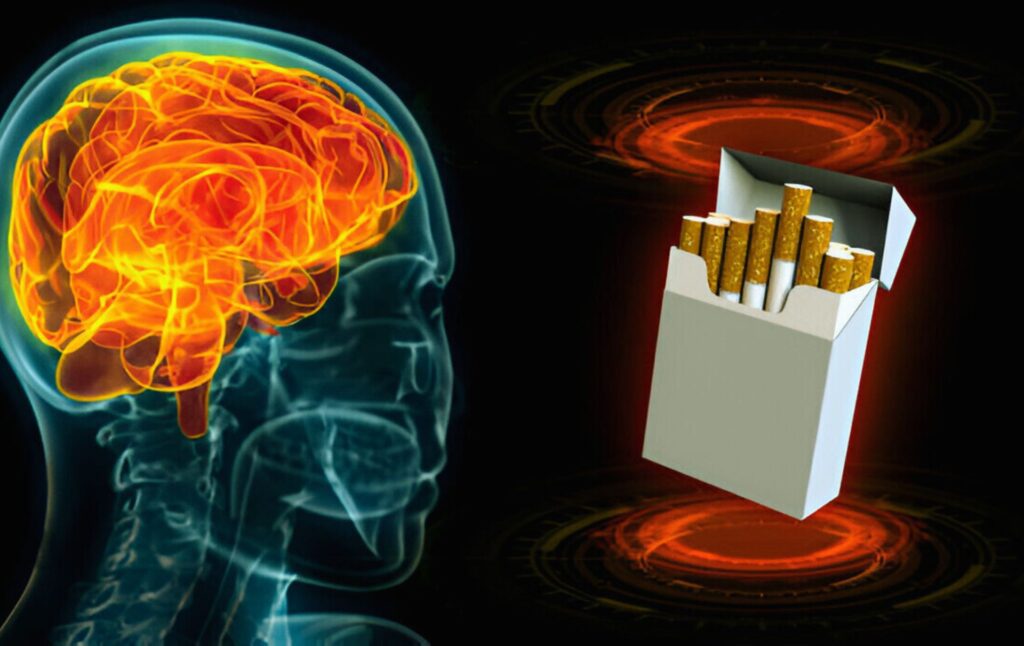Nicotine Affect the Brain by changing the way it releases chemicals, and controls thinking, mood, and feelings of reward. While it can improve some brain functions for a short time, its addictive nature and possible long-term damage make it a worrying substance.
Nicotine can enter the body in several ways: smoking cigarettes, using e-cigarettes, chewing tobacco, or using nicotine patches and gums. Once in the body, nicotine quickly gets absorbed into the bloodstream.
How Nicotine Enters the Body
Nicotine can enter the body in several ways, including smoking, vaping, patches, and gum. When you smoke a cigarette, nicotine is inhaled into the lungs and quickly absorbed into the bloodstream. Vaping works similarly, but the nicotine comes from a liquid that’s heated into a vapor.
Nicotine patches and gum are different. The patch sticks to your skin, slowly releasing nicotine that gets absorbed through the skin and into the blood. Nicotine gum is chewed, releasing nicotine that gets absorbed through the lining of the mouth. Once in the bloodstream, nicotine travels to the brain, creating the effects that people often seek from it.
Short-Term Effects of Nicotine on the Brain
Nicotine can quickly affect the brain, making you feel more alert and able to concentrate better. It can also enhance your mood and provide temporary relief from stress, which is why some people turn to nicotine in stressful situations.
Physically, nicotine increases your heart rate and blood pressure. These changes happen soon after using nicotine, making you feel more awake and energized. However, these effects are short-term and wear off as the nicotine leaves your system.
Long-Term Effects of Nicotine on the Brain
Over time, nicotine can lead to addiction, making it hard to stop using it. This addiction can cause long-term changes in the brain, affecting how it works and how you feel.
Nicotine can also cause cognitive problems, such as memory issues and difficulties with thinking clearly. Additionally, long-term nicotine use can impact mental health, leading to increased anxiety and depression. These effects make it crucial to understand the risks of using nicotine over a long period.
How does nicotine affect the brain of 18-year-olds
While 18-year-olds are legally considered adults, their brains are still under development. This ongoing process makes them particularly susceptible to the effects of nicotine. Here’s how nicotine can impact an 18-year-old brain:

- Disrupts Learning and Focus: Nicotine can interfere with the brain’s ability to concentrate, retain information, and form memories. This can hinder learning in school or during important developmental stages.
- Boosts Impulsivity and Risk-Taking: Nicotine can influence how the brain processes rewards, making 18-year-olds more prone to impulsive decisions and risky behavior.
- Hinders Brain Maturation: Nicotine use can slow down the growth of the prefrontal cortex, a critical area responsible for planning, decision-making, and controlling impulses. This can have long-term consequences for these skills.
- Raises Addiction Risk: Nicotine is highly addictive, and starting at a young age increases the likelihood of nicotine dependence and potentially other substances later in life.
Does nicotine affect young brains in a bad way?
Nicotine has detrimental effects on young brains. The developing brain, especially during adolescence (roughly up to age 25), is particularly sensitive to nicotine’s influence. Here’s how it can be harmful:
- Addiction: Young people are more susceptible to nicotine’s addictive properties. It disrupts the brain’s reward system, making them crave nicotine and potentially leading to dependence.
- Cognitive Decline: Nicotine use can hinder memory, concentration, and learning abilities. It might also lead to long-term issues with focus and decision-making.
- Mental Health Concerns: Studies suggest a link between nicotine use and an increased risk of depression, anxiety, and even schizophrenia in young people.
Must Read: Uses of THC Syrup: Benefits Side Effects and Risks
How does nicotine affect the nervous system
Nicotine affects the nervous system in interesting and complex ways. Here’s a closer look at how it works:
| Effect on the Nervous System | Description |
| Stimulation of nAChRs | Nicotine binds to nicotinic acetylcholine receptors (nAChRs) in the nervous system, mimicking the action of acetylcholine. This leads to increased neural activity and neurotransmitter release. |
| Release of Neurotransmitters | Nicotine causes the release of dopamine, norepinephrine, serotonin, and acetylcholine, contributing to feelings of pleasure, increased alertness, and enhanced cognitive functions temporarily. |
| Effects on Brain Function | In the brain, nicotine affects areas involved in reward, learning, and addiction. It can enhance attention and memory in the short term but may lead to tolerance and dependence with chronic use. |
| Peripheral Nervous System Effects | Nicotine stimulates skeletal muscle contraction by activating nAChRs at neuromuscular junctions, potentially enhancing physical performance temporarily. |
| Autonomic Nervous System Effects | Nicotine increases heart rate, blood pressure, and affects gastrointestinal activity by influencing the autonomic nervous system, which controls involuntary bodily functions. |
| Long-Term Consequences | Chronic nicotine use can lead to addiction, tolerance, and potential nervous system damage. It may also increase the risk of neurological disorders and impact overall brain function and health. |
Is nicotine good for stress
No, nicotine is not good for stress. It can make stress worse. While nicotine may initially feel like it helps relieve stress, this is a temporary feeling. Nicotine makes your heart beat faster and raises your blood pressure because it’s a stimulant. This can make you feel more on edge and anxious in the long run.
- Addictive: Nicotine is very addictive. People who use it to deal with stress can end up feeling even more stressed when they try to stop.
- Increases Anxiety: Nicotine can make anxiety worse. It speeds up your heart rate and can make you feel more nervous and jittery.
- Affects Sleep: Nicotine can mess with your sleep, which can make stress harder to handle.
How to do Nicotine Replacement Therapies work
Nicotine replacement therapy (NRT) helps people stop smoking by giving them a small, controlled amount of nicotine from a different source than cigarettes. This reduces cravings and withdrawal symptoms, making it easier to quit smoking
Nicotine Cravings and Withdrawal:
Cigarettes contain nicotine, which is highly addictive. When you quit smoking, your body craves nicotine, leading to withdrawal symptoms like irritability, anxiety, and trouble focusing.
NRT Delivers Controlled Nicotine:
NRT products like patches, gum, lozenges, sprays, or inhalers provide a controlled amount of nicotine. This replaces some of the nicotine you used to get from cigarettes.
Reduced Cravings and Withdrawal:
The gradual release of nicotine from NRT helps lessen cravings and withdrawal symptoms. This makes quitting smoking more manageable.
No Harmful Chemicals:
Unlike cigarettes loaded with harmful chemicals, NRT delivers only nicotine. This significantly reduces the health risks associated with smoking.
Conclusion
Nicotine affects the brain by altering neurotransmitter activity, leading to addiction and cognitive changes that impact decision-making and behavior. Long-term nicotine use may lead to structural changes in the brain, further reinforcing addictive behaviors. Understanding these effects is crucial for developing effective strategies to combat nicotine addiction and its neurological consequences.
FAQS
How quickly does nicotine affect the brain?
Nicotine reaches the brain within seconds after being inhaled, leading to almost immediate effects.
Can nicotine improve cognitive function?
While nicotine can temporarily enhance alertness and concentration, its long-term effects can harm cognitive function.
What makes nicotine so addictive?
Nicotine’s ability to rapidly release dopamine creates a strong sense of pleasure and reward, contributing to its addictive nature.
Are there any benefits to nicotine?
Short-term benefits include increased alertness and mood enhancement, but the long-term risks outweigh these.
How can one effectively quit nicotine?
Effective strategies include nicotine replacement therapies, support groups, and personalized treatment plans that address both physical and psychological aspects of addiction.







